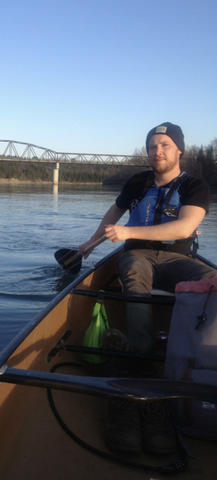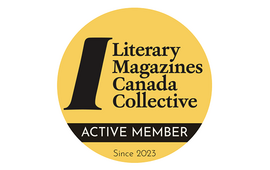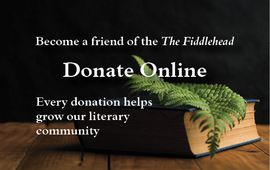
The Fiddlehead Editor Sue Sinclair interviewed Conor Kerr about his poem, "Amiskwaciy Nehiyawak (Beaver Hills Cree),” that won our Ralph Gustafson Poetry Prize and will appear in the Spring 2020 issue of The Fiddlehead (no. 283).
Sue Sinclair: This poem feels very gentle in spirit, very tender in its attentions, yet it has style, a little swagger (“We’re going to swish it up” and “Bounce is too much, but hell bounce is too much for everyone”). I don’t know if “swagger” feels like the right word to you, but if it does or is close, why opt for a narrative voice with a little swagger for this poem?
Conor Kerr: This poem is straight up my grandma, Pat. That lady has mad swagger and you can see it in all her interactions, conversations, and how she moves through this world. She doesn’t do anything half-assed. That includes making her moonshine on the Northside of Edmonton. She did that for years, until my grandfather passed away and she decided at the age of 87 to hightail it out to Vancouver Island. Now she currently makes moonshine in her assisted-living building there. Nice thing about Vancouver Island is she has more access to fresh blackberries, and other fruits so her “swish” quality has gone through the roof. If I’m writing something that’s from her attitude or mindset, it’s going to be one of not buying into the constraints of a western system. To put this in perspective, Pat is the kind of lady who could care less about my degrees, awards, etc., but she’ll brag to her friends all day about the time I was dealt a hand of 29 in crib. In her eyes that’s the greatest accomplishment one could ever get.
SS: One of my favourite moments in the poem is when granny “reconciles” with the house gardens by picking their flowers and berries at night. I love the way you’ve torqued this very loaded word, love the idea of this secret “reconciliation” that is entirely on granny’s terms. What does reconciliation mean to you?
CK: Reconciliation is a government term. I love laughing at the idea of my grandmother and her friends using the word reconciliation, or even my cousins, it’s a term and word that doesn’t translate down to a community level. That would never happen. It doesn’t exist to them and it never will, especially as Canada continues to reinforce colonial patriarchy on Indigenous communities and peoples. I’ve worked for all levels of bureaucracy at this point and I know a good buzz word when I see one. Right now I feel it’s transitioning more towards decolonization or Indigenization, but still these words are being used in the same context as reconciliation, which is truly a financial term. The only time reconciliation makes sense to me is when I’m doing the budget for the Indigenous Student Centre at NorQuest College. But that’s classic Canada, creating a financially based word to talk about their future and past relationships with Indigenous Peoples.
So after that tangent, in the context of this poem, I would say it’s less reconciliation and more LAND BACK. Granny, as a strong Indigenous matriarch, is mocking reconciliation and reclaiming her agency and place on the territory that her ancestors have called home for countless generations.
SS: Who is your ideal audience for this poem?
CK: You know, honestly, I’ve never thought much about audience. I’m still amazed that anyone wants to read anything I’ve written. I think there are a lot of lonely Indigenous People in these cities who feel a disconnect from everything and everyone around them. I really felt that when I was in university and I took it out in my actions. If someone who’s feeling lonely chances along one of these poems and thinks, “oh shit now that’s funny, go get them Granny!” And ideally they smile a bit and know that there are forms of resistance happening at all levels, doesn’t matter how small or insignificant it seems, it all counts.
But that being said I’m realistic about the people who read literary magazines and it’s not my Grandma and her friends. So basically, in an ideal situation, I see this cycle where some prof (hint hint all you out there) will bring this poem into their class. Half the students will think it’s horseshit, and the rest might not care, but there may be one or two who connect. Mind you if the prof or other person also connects to it because they’re feeling out of place in a western academic institution then that’s perfect too. Or they’re a settler ally and this teaches them something new….. ahh shit, who am I kidding, poetry is for everyone. Except billionaires.
SS: The poem’s title is the name of a people, “Amiskwaciy Nehiyakwak,” translated in parentheses as “Beaver Hills Cree.” The poem itself is an ode to one person: granny. How do you see the title relating to the rest of the poem?
CK: The vast majority of settlers have no comprehension about how Indigenous peoples lived prior to colonization. To them everyone was running around in the groups that would eventually become the individual First Nations. It wasn’t like that at all though. The families that would become Enoch Cree Nation or Papaschase First Nation didn’t refer to themselves by those names until long after Treaty, the Indian Act, and the reservation systems were really put into place. They would have referred to themselves in the Edmonton area as the Amiskwaciy Nehiyawak, Beaver Hills Cree. Just like down south from Edmonton they would have referred to themselves as the Maskwacis Nehiyawak, Bears Hills Cree. It was way more fluid than it is now. My family is descended from the Amiskwaciy Nehiyawak that would eventually become the Papaschase First Nation, as well as the Cree speaking Metis communities from this area. There are people, like Dr. Dwayne Donald, who are a lot smarter than me that have done fantastic and really informing research on this. So to keep a long story long, the title is also Granny’s way of reclaiming Land Back in this territory by referring to it by its proper name. But since I’m an educator I’m used to putting in rough translations to help people start grasping the concepts.
Conor Kerr is Metis, descended from the Fort des Prairies and Lac Ste. Anne communities. He grew up in Buffalo Pound Lake, Saskatchewan and currently lives in Edmonton where he's a part-time magpie interpreter, Labrador Retriever wrestler, harvester, and educator. Conor feels honoured to live and write on the lands that his family has called home since time immemorial.











Add new comment